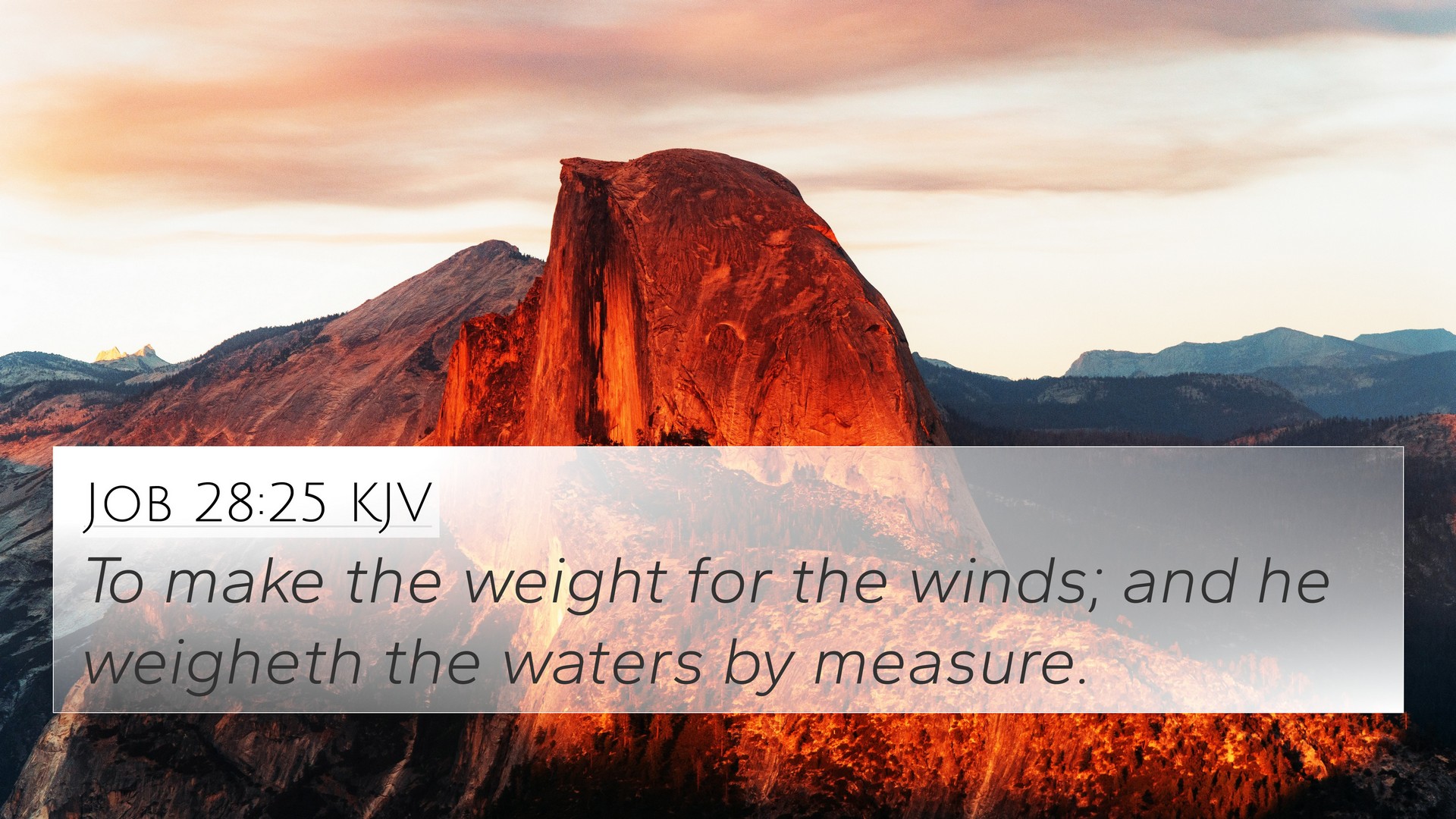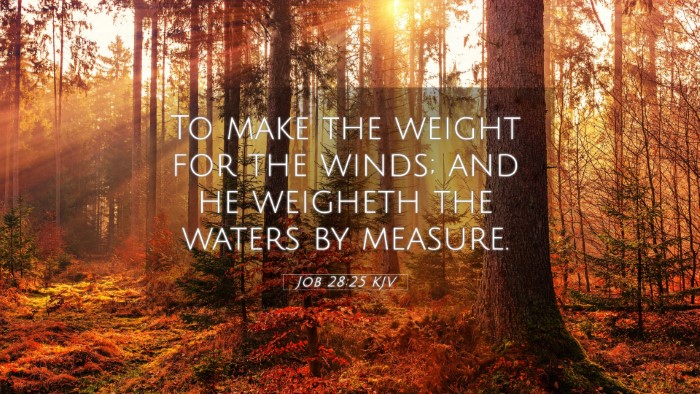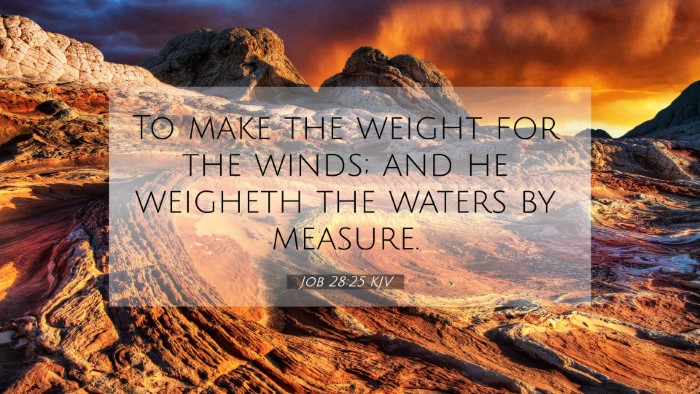Old Testament
Genesis Exodus Leviticus Numbers Deuteronomy Joshua Judges Ruth 1 Samuel 2 Samuel 1 Kings 2 Kings 1 Chronicles 2 Chronicles Ezra Nehemiah Esther Job Psalms Proverbs Ecclesiastes Song of Solomon Isaiah Jeremiah Lamentations Ezekiel Daniel Hosea Joel Amos Obadiah Jonah Micah Nahum Habakkuk Zephaniah Haggai Zechariah MalachiJob 28:25 Similar Verses
Job 28:25 Cross References
To make the weight for the winds; and he weigheth the waters by measure.
Uncover the Rich Themes and Topics of This Bible Verse
Listed below are the Bible themes associated with Job 28:25. We invite you to explore each theme to gain deeper insights into the Scriptures.
Job 28:25 Cross Reference Verses
This section features a detailed cross-reference designed to enrich your understanding of the Scriptures. Below, you will find carefully selected verses that echo the themes and teachings related to Job 28:25 KJV. Click on any image to explore detailed analyses of related Bible verses and uncover deeper theological insights.
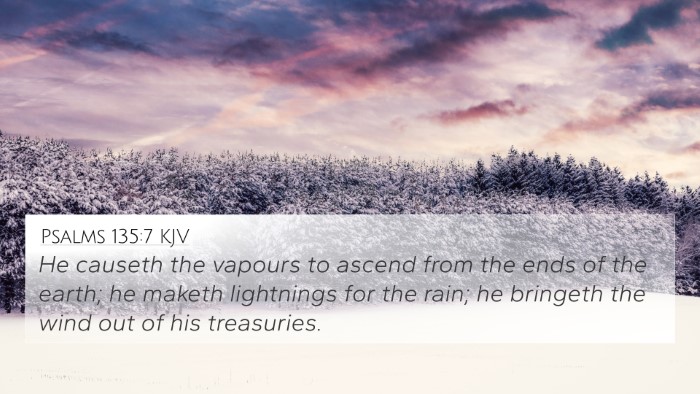
Psalms 135:7 (KJV) »
He causeth the vapours to ascend from the ends of the earth; he maketh lightnings for the rain; he bringeth the wind out of his treasuries.
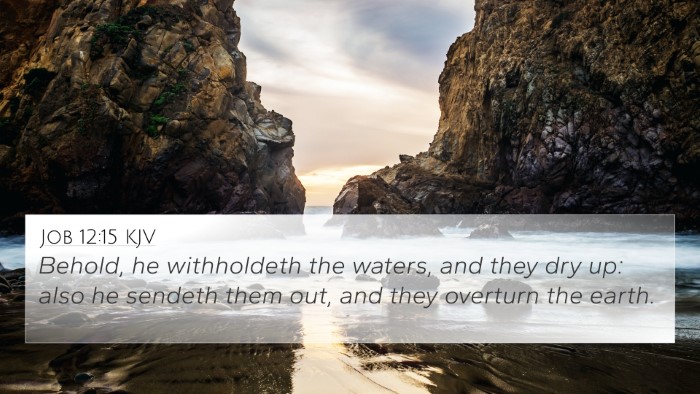
Job 12:15 (KJV) »
Behold, he withholdeth the waters, and they dry up: also he sendeth them out, and they overturn the earth.
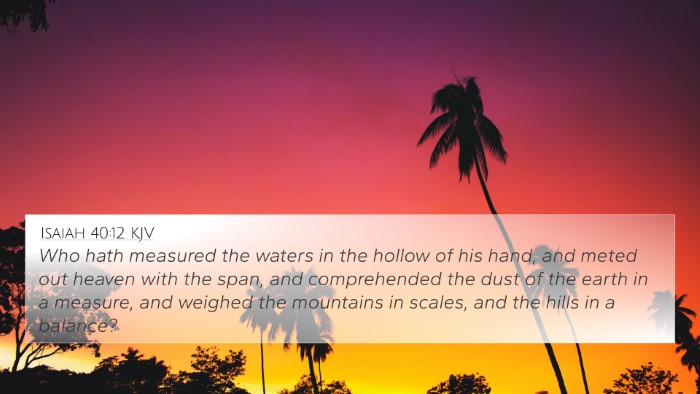
Isaiah 40:12 (KJV) »
Who hath measured the waters in the hollow of his hand, and meted out heaven with the span, and comprehended the dust of the earth in a measure, and weighed the mountains in scales, and the hills in a balance?
Job 28:25 Verse Analysis and Similar Verses
Understanding Job 28:25
Job 28:25 states, "To make the weight for the winds; and he weigheth the waters by measure." This verse reflects profound insights into the nature of God’s governance over creation, particularly emphasizing His omniscience and omnipotence.
Verse Meaning and Interpretation
This scripture highlights God's incredible ability to measure and control the forces of nature. Public domain commentaries such as those by Matthew Henry, Albert Barnes, and Adam Clarke provide rich interpretations.
-
Matthew Henry:
Henry emphasizes the wisdom of God in creation, presenting the image of God as one who establishes order in chaos. The "weight for the winds" signifies God's control over the atmosphere and storms, while "weighing the waters" symbolizes His mastery over the seas, reflecting the balance He brings to natural forces.
-
Albert Barnes:
Barnes points out that this verse exemplifies God as an intelligent designer who has the capacity to control the elements. The figure of balancing the winds indicates that nothing in Heaven or Earth occurs without His knowledge and power. This reference raises awareness of God’s meticulous planning and management of creation.
-
Adam Clarke:
Clarke interprets this verse by emphasizing God’s preeminence in the universe. He discusses the significance of God’s ability to weigh and measure, which suggests forethought in the creation process and indicates the harmony in nature established by divine providence.
Thematic Connections
In this solitary verse, the themes of God’s sovereignty, wisdom, and the order of creation emerge prominently. It sets a foundation for exploring additional scriptures related to these themes.
Cross-References for Job 28:25
For deeper understanding, here are several Bible cross-references that relate to Job 28:25:
- Psalm 104:24-25: "O LORD, how manifold are thy works! In wisdom hast thou made them all: the earth is full of thy riches." This reinforces the idea of God's wisdom in creation.
- Proverbs 30:4: "Who hath ascended up into heaven, or descended? Who hath gathered the wind in his fists? Who hath bound the waters in a garment?..." This verse parallels the measurements exerted by God over nature.
- Isaiah 40:12: "Who hath measured the waters in the hollow of his hand, and meted out heaven with the span..." This directly echoes the imagery of God's measurement of the waters.
- Job 37:16: "Dost thou not know when God is silent, and dost thou not know that his wonders today communicate all the elements he has created?" This verse speaks to God's governance over nature.
- Jeremiah 5:22: "Fear ye not me? saith the LORD: will ye not tremble at my presence, which have placed the sand for the bound of the sea..." This demonstrates God's authority over the seas, tied to Job 28:25’s themes.
- Matthew 8:26: "And he saith unto them, Why are ye fearful, O ye of little faith? Then he arose, and rebuked the winds and the sea; and there was a great calm." This reflects Jesus’s control over nature, affirming divine power.
- Revelation 20:11: "And I saw a great white throne, and him that sat on it, from whose face the earth and the heaven fled away; and there was found no place for them." This highlights God’s ultimate authority over creation.
Connecting Biblical Themes
This understanding of God as the sovereign ruler over nature links to broader biblical themes of creation and divine oversight. The narrative of God's power invites believers to reflect on His protection and governance in their lives.
Tools for Further Study
To gain a more comprehensive understanding of cross-referencing Bible verses, consider the following tools and methods:
- Bible Concordance: A tool that lists words alphabetically with corresponding verse locations, facilitating effective studies of specific terms.
- Bible Cross-Reference Guide: This can direct you towards related scriptures, enhancing your study of themes and connections.
- Cross-Reference Bible Study Methods: Learn methods that allow the linking of verses across books and contexts effectively.
- Comprehensive Bible Cross-Reference Materials: Utilize resources that offer extensive connections between different Biblical texts.
Conclusion
Job 28:25 serves as a powerful reminder of God’s sovereign control over creation. By exploring cross-references and thematic connections, believers can appreciate the depth of scripture and the interconnectedness of God’s word. Tools for cross-referencing not only enrich one’s understanding but also deepen one’s faith as connections become evident through the biblical narrative.
